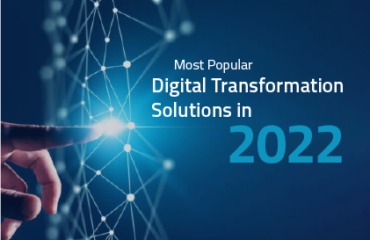Emerging Technology & Its Impact on the Business Landscape

By: Alaa Khattab, Senior Director of Technology & Consulting Services
Emerging Technology is growing at a rapid pace, exerting unmatchable pressure on companies to act fast to adapt to innovations that quickly outpace outdated practices. In this era, we are now living through technological breakthroughs and embracing a new lifestyle that is considered convenient. The emerging technology uprise has so far received striking acceptance and shown an impact on the business landscape.
Consequently, business leaders started strategizing for the major shifts being witnessed on a global scale. Embracing change is now the modern key to a successful business that is willing to ride the tide of progress. New trends are expected to revolutionize business operations, with more than three-quarters of banking executives globally claiming that their companies are ready to boost their budget on emerging technologies this year, according to a 2023 report by Forrester.
Artificial Intelligence (AI) advancements such as Large Language Model LLM ChatGPT and Autonomous GPT (Auto-GPT) have garnered impressive attention beyond other emerging technologies or IT advancements. Major technological upheavals that proved to have an impact on businesses have inspired business leaders to adopt and adapt.
Emerging Technology Trends
Over the course of history, it has become evident that businesses are prepared to keep evolving alongside technological discoveries in order to continue growing and unlock improved capabilities. To their benefit, the past few years alone introduced exciting innovations, especially in the Artificial Intelligence (AI) corner.
Current trends that companies and organizations can adopt have been at the center of many discussions, theories, and even some backlash. These trends include Large Language Models (LLMs), Autonomous Technology, and Artificial Superintelligence (ASI).
A type of Artificial Intelligence, LLMs utilize machine learning algorithms to analyze and generate language. One of the most popular LLMs is the widely talked about ChatGPT and recently Auto-GPT, which are used to perform language tasks to help companies improve their business operations. LLMs offer numerous benefits to businesses that are looking to stay competitive in an increasingly digital world. Through this level of innovation, for instance, companies can create an exceptional customer experience that is personalized by offering advanced phone or chat support. The advantages are large, this is proven in an IDC report that forecast accelerated progress in adaptive and generative AI, with AI spending projected to exceed $500 in 2023.
Any technology that can make its own decisions is labeled as autonomous technology, something that goes beyond what is conventional and taps into a futuristic world. Autonomous technology (self-driving or robotic tech) leverages automation and AI to relieve businesses from mundane tasks that can be achieved in an innovative manner. A perfect example of that is drones or self-driving vehicles, they are being deployed for goods and products transportation while freeing up the human workforce to focus on higher-level responsibilities. Companies are utilizing autonomous technology for its many advantages such as cutting costs, enhancing productivity, and streamlining operations to reach greater efficiency.
ASI, or super AI, is a theoretical possibility that can completely change the way we operate a business. Viewed as a new level of intellect, super AI could in fact become smarter than humans, according to Nick Bostrom, director of the Future of Humanity Institute. This form of advanced AI manifests cognitive skills and develops thinking skills independently, with human-like capabilities such as understanding human emotions and performing all tasks that humans can. The potential features presented to businesses through super AI are enormous, they can include significant improvement in operations efficiency, major cost saving, gaining valuable insights and competitive advantage, and receiving accurate predictions related to market trends and consumer behavior.
ChatGPT VS. Auto-GPT
The two modern creations that impressed the world, ChatGPT and Auto-GPT, are both developed as Large Language Models (LLMs) through the same underlying architecture. These AI technologies offer companies a great advantage in utilizing them, each in a unique way.
ChatGPT is an interactive conversational model that is chat-based. It is used by students, employees, and organizations as a portal for performing language tasks encompassing translation, analysis, and content creation. This intelligent chatbot is beneficial according to conversational data harvested for generating responses relevant to the context of a conversation, as it was trained.
Auto-GPT, on the other hand, relies more on action rather than content. It is a revolutionary general-purpose language model that is perceived as the “next frontier of prompt engineering”, as affirmed Andrej Karpathy, Tesla’s former director of AI and Autopilot Vision who is now OpenAI’s deep learning and computer vision specialist. Auto-GPT “chains together LLM ‘thoughts,’ to autonomously achieve whatever goal you set,” as described by GitHub. Simply speaking, Auto-GPT is a self-dependent tool that decides which approach is the best to assume for achieving a target.
Overall, even though the two powerful AI tools are variations of the same architecture to generate human-like text, their design differs from one use case to another while offering distinct types of strengths. While ChatGPT is better suited for chatbot applications, Auto-GPT is more of a general-purpose language model that has the capability to perform autonomous tasks such as booking flights or ordering meals.
AI Role in Rethinking the Business Landscape
With Artificial Intelligence, change is inevitable. Business leaders have acknowledged this as a fact and are beginning to welcome the role that AI plays in the business landscape. Accordingly, AI services are projected to record a 22% increase in spending growth at a compound annual growth rate (CAGR), achieving the fastest spending growth, based on a report conducted by IDC.
The Artificial Intelligence uprise is supporting businesses in reimagining their operations to provide new opportunities and challenges. The business landscape is currently being transformed at an unprecedented pace simultaneously with the arrival of new AI technologies. In fact, AI now plays a leading role in altering the business landscape as it gives the ability to automate tasks and streamline processes thus enabling companies to save time and money.
New opportunities created by AI also include ensuring better decision-making through generating real-time insights into customer behavior and market trends. The business landscape is expected to witness new prospects, from being empowered with optimized business operations to ensuring enhanced productivity and a stronger competitive advantage.
AI also created some challenges for businesses and within the workplace. One of the most asked questions is: will AI create employment opportunities at the same pace as losing them? It is always economically proven that the answer to this challenge is yes. Employees in all industries are encouraged to have the willpower to change and move forward, to adapt to the new ways of the digital world through embracing the better opportunities that are continuously being presented to us.
When all is said and done, companies and organizations formed an understanding when it comes to the importance of making use of a platform that provides the power to obtain complete visibility over their technology suite. When a company is ready to progress, it subsequently walks towards guaranteed success if a winning business landscape is followed. The transformation we are looking at is expected to ensure an AI ecosystem that is more secure and clear and that will work for any business.
Conclusion
Emerging Technology is playing a critical role in business empowerment. As technology evolves, a company can more easily and swiftly enhance its business from obtaining comprehensive visibility to improving efficiency to reaching new customers using social media channels and other digital platforms. To reiterate, it has become clear that businesses should be willing to adapt to the era of emerging technology and AI or risk falling behind. Finding ways to incorporate technological innovations into operations can help companies gain a competitive edge thus incredibly raising the odds of success in the years to come. The actions that we make from AI, for instance, can be the key to predicting potential losses and wins while making the necessary improvements needed to secure a stable and thriving future. As technology evolves, we can expect more exciting developments that will act as a bridge for empowerment and progress.
About the Author
Alaa Khattab is the Senior Director of Technology & Consulting Services at Technology Strategies Middle East (TSME). He is an industry professional backed by over 20 years of insightful experience in Digital Transformation, Business Improvement, Performance Management, and Enterprise Architecture among other technology and consulting fields. Mr. Alaa is practiced at leading cross-functional teams of professionals with high caliber in areas surrounding digital transformation and operations management. He is a technology expert looking to contribute to digital innovations that play a key role in enhancing businesses and transforming operations.



